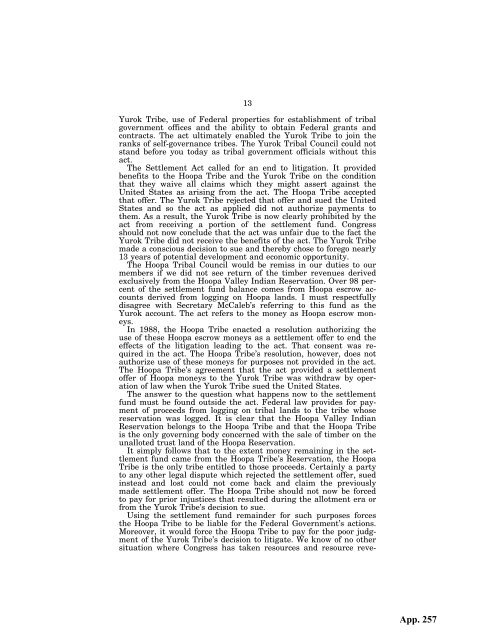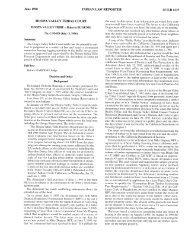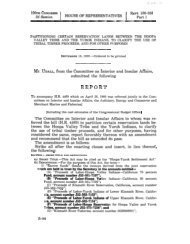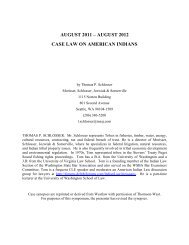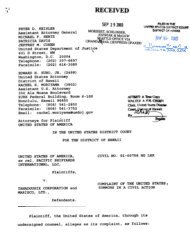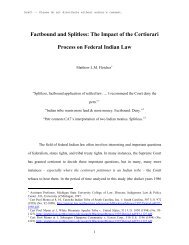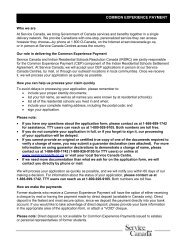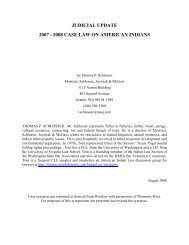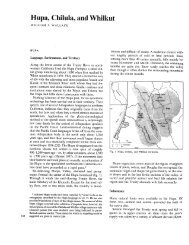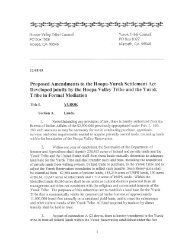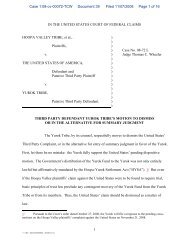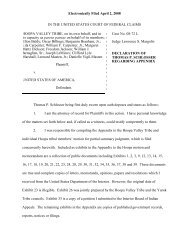Hoopa appendix supporting summary judgment - Schlosser Law Files
Hoopa appendix supporting summary judgment - Schlosser Law Files
Hoopa appendix supporting summary judgment - Schlosser Law Files
Create successful ePaper yourself
Turn your PDF publications into a flip-book with our unique Google optimized e-Paper software.
13<br />
Yurok Tribe, use of Federal properties for establishment of tribal<br />
government offices and the ability to obtain Federal grants and<br />
contracts. The act ultimately enabled the Yurok Tribe to join the<br />
ranks of self-governance tribes. The Yurok Tribal Council could not<br />
stand before you today as tribal government officials without this<br />
act.<br />
The Settlement Act called for an end to litigation. It provided<br />
benefits to the <strong>Hoopa</strong> Tribe and the Yurok Tribe on the condition<br />
that they waive all claims which they might assert against the<br />
United States as arising from the act. The <strong>Hoopa</strong> Tribe accepted<br />
that offer. The Yurok Tribe rejected that offer and sued the United<br />
States and so the act as applied did not authorize payments to<br />
them. As a result, the Yurok Tribe is now clearly prohibited by the<br />
act from receiving a portion of the settlement fund. Congress<br />
should not now conclude that the act was unfair due to the fact the<br />
Yurok Tribe did not receive the benefits of the act. The Yurok Tribe<br />
made a conscious decision to sue and thereby chose to forego nearly<br />
13 years of potential development and economic opportunity.<br />
The <strong>Hoopa</strong> Tribal Council would be remiss in our duties to our<br />
members if we did not see return of the timber revenues derived<br />
exclusively from the <strong>Hoopa</strong> Valley Indian Reservation. Over 98 percent<br />
of the settlement fund balance comes from <strong>Hoopa</strong> escrow accounts<br />
derived from logging on <strong>Hoopa</strong> lands. I must respectfully<br />
disagree with Secretary McCaleb’s referring to this fund as the<br />
Yurok account. The act refers to the money as <strong>Hoopa</strong> escrow moneys.<br />
In 1988, the <strong>Hoopa</strong> Tribe enacted a resolution authorizing the<br />
use of these <strong>Hoopa</strong> escrow moneys as a settlement offer to end the<br />
effects of the litigation leading to the act. That consent was required<br />
in the act. The <strong>Hoopa</strong> Tribe’s resolution, however, does not<br />
authorize use of these moneys for purposes not provided in the act.<br />
The <strong>Hoopa</strong> Tribe’s agreement that the act provided a settlement<br />
offer of <strong>Hoopa</strong> moneys to the Yurok Tribe was withdraw by operation<br />
of law when the Yurok Tribe sued the United States.<br />
The answer to the question what happens now to the settlement<br />
fund must be found outside the act. Federal law provides for payment<br />
of proceeds from logging on tribal lands to the tribe whose<br />
reservation was logged. It is clear that the <strong>Hoopa</strong> Valley Indian<br />
Reservation belongs to the <strong>Hoopa</strong> Tribe and that the <strong>Hoopa</strong> Tribe<br />
is the only governing body concerned with the sale of timber on the<br />
unalloted trust land of the <strong>Hoopa</strong> Reservation.<br />
It simply follows that to the extent money remaining in the settlement<br />
fund came from the <strong>Hoopa</strong> Tribe’s Reservation, the <strong>Hoopa</strong><br />
Tribe is the only tribe entitled to those proceeds. Certainly a party<br />
to any other legal dispute which rejected the settlement offer, sued<br />
instead and lost could not come back and claim the previously<br />
made settlement offer. The <strong>Hoopa</strong> Tribe should not now be forced<br />
to pay for prior injustices that resulted during the allotment era or<br />
from the Yurok Tribe’s decision to sue.<br />
Using the settlement fund remainder for such purposes forces<br />
the <strong>Hoopa</strong> Tribe to be liable for the Federal Government’s actions.<br />
Moreover, it would force the <strong>Hoopa</strong> Tribe to pay for the poor <strong>judgment</strong><br />
of the Yurok Tribe’s decision to litigate. We know of no other<br />
situation where Congress has taken resources and resource reve-


